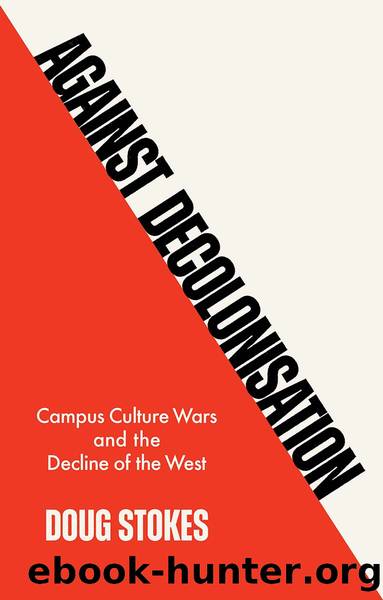Against Decolonisation by Doug Stokes

Author:Doug Stokes [Stokes, Doug]
Language: eng
Format: epub
Published: 2023-11-06T00:00:00+00:00
The Eurocentric nature of decolonial history
This turns the decolonisation critique on its head. For example, a leading South African decolonisation advocate, Siyanda Makaula, argues that scientistsâ appeal to universal applicability is problematic. Scientists âoften hide behind their disciplinesâ putative universality â that a cell is a cell, whether it belongs to an African or a European, or that the laws of physics apply to all â to avoid the need to question the way they do thingsâ.11 Similarly, Prescod-Weinstein argues that what she calls white empiricism has come to âdominate empirical discourse in physics because whiteness powerfully shapes the predominant arbiters of who is a valid observer of physical and social phenomenaâ.12
We see similar claims in other science fields. For example, the Quality Assurance Agency provides guidance for all UK universities. In its 2022 maths guidance, it has argued that the UK-wide Mathematics, Statistics and Operational Research (MSOR) âcurriculum should present a multicultural and decolonised viewâ that is âinformed by the student voiceâ. Similarly, the values of âEDI should permeate the curriculum and every aspect of the learning experience to ensure the diverse nature of society in all its forms is evidentâ. Providers âshould reflect on their curricula and processes to ensure that no group is disadvantaged or othered; for example, decolonising the curriculum can involve explicit reflection on the history of MSOR knowledge generation, as well as reflecting on how delivery or admission practices might adversely impact on certain subgroups within the student cohort. EDI aspects of student engagement and achievement should be monitored and actions formed to ensure equity.â13 This is a form of magical thinking whereby the beliefs (or rather the authorâs identity) somehow transmogrify that which is being examined and is rooted in the social constructivism we discussed above.
The laws of physics or maths exist independently of the scientistâs identity. Our knowledge of those laws is fallible and relative but, given the mind independence of the phenomenon our knowledge gradually uncovers, we can rationally adjudicate between different interpretations to ascertain veracity and optimal explanations that are, in turn, superseded as learning progresses.
A key problem that OlúfẹÌmi TáÃwò identifies is that this decolonial critique fully embraces âthe racialisation of consciousnessâ, where modernity and science are seen as âwhiteâ and therefore, in some intrinsic way anti-black.14 In this, Africans or, more broadly, the agency of non-European cultures are portrayed as either victims or resisters against modernity itself ârather than critical appropriators of itâ.15 TáÃwò argues that this âabsolutisation of European colonialismâ turns Africans into âpermanent subalterns in their historyâ. Instead, he says that we need to take African agency and the histories of non-European states and civilisations seriously, and not as mere objects of European perfidiousness without their own agency, interests and accounts. Through the castigation of modernity or the broader scientific Enlightenment as racially tainted, a âhermeneutics of suspicionâ is introduced, which undermines the capacity for democratic dialogue. Life becomes an endless struggle that pits people against one another based on identity.16
This also has implications for the nature of African governance today.
Download
This site does not store any files on its server. We only index and link to content provided by other sites. Please contact the content providers to delete copyright contents if any and email us, we'll remove relevant links or contents immediately.
The Secret History by Donna Tartt(19086)
The Social Justice Warrior Handbook by Lisa De Pasquale(12190)
Thirteen Reasons Why by Jay Asher(8909)
This Is How You Lose Her by Junot Diaz(6885)
Weapons of Math Destruction by Cathy O'Neil(6279)
Zero to One by Peter Thiel(5801)
Beartown by Fredrik Backman(5754)
The Myth of the Strong Leader by Archie Brown(5507)
The Fire Next Time by James Baldwin(5442)
How Democracies Die by Steven Levitsky & Daniel Ziblatt(5218)
Promise Me, Dad by Joe Biden(5153)
Stone's Rules by Roger Stone(5087)
A Higher Loyalty: Truth, Lies, and Leadership by James Comey(4960)
100 Deadly Skills by Clint Emerson(4924)
Rise and Kill First by Ronen Bergman(4788)
Secrecy World by Jake Bernstein(4752)
The David Icke Guide to the Global Conspiracy (and how to end it) by David Icke(4717)
The Farm by Tom Rob Smith(4507)
The Doomsday Machine by Daniel Ellsberg(4490)
